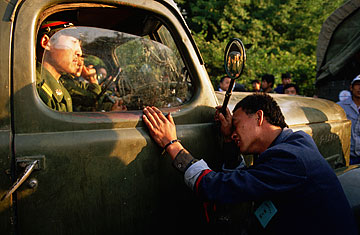
A weary protester pleads with a PLA officer to halt the crackdown
June 4, Beijing, China
It was clear by the start of the year that 1989 would be an extraordinary time for China. A free-speech movement had begun to flower at Peking University, where students and some professors held a series of "democratic salons" on the campus lawn. People would stand in a circle and vigorously debate issues that were normally off-limits, like the need for political freedom.
As the Wall Street Journal's Beijing bureau chief, I witnessed several of these gatherings. I'd stand at the perimeter listening to the speakers, marveling at their courage. I'd scan the crowd for plainclothes police and usually spot a couple of likely subjects. Yet the participants never seemed cowed. It was all about openness: Why should anyone object to discussions about issues critical to China's future? The leaders were a 19-year-old history major named Wang Dan and the dissident astrophysicist Fang Lizhi. When the dust would settle some months later after Tiananmen, both had been branded public enemies.
But in early 1989 anything seemed possible, and the risk-taking ethos spread far and wide. One of my most vivid memories was the exhilarating avant-garde exhibition at the National Art Gallery in Beijing. For a few days, the walls of the gallery were filled with the whimsical and grotesque variations on Maoist propaganda that would, years later, make some Chinese artists very rich. Banners unfurled on the street outside proclaimed "No U-Turn," hinting that China would never be the same. The dramatic highlight was an installation called Dialogue, involving a telephone booth with mirrors inside. Its co-creator, a young woman named Xiao Lu, pulled out a handgun and shot two bullets at the work. The police arrived and shut down the exhibition for the rest of that first day. But a powerful statement had been made. A defiant spirit had been unleashed in China that would inevitably lead toward a violent denouement.
All of us seemed like kids at the time — the artists, the activists, the demonstrators, the journalists taking notes — brimming with ambition and churning with idealism and hope. It wasn't always easy for Chinese to mingle with foreign journalists, but we found ways. I used to sneak friends past the official checkpoints into the foreign compound that housed my home and my office. At the end of 1988 my wife — Dinda Elliott, Newsweek's bureau chief — and I hosted a Christmas party at our home. The crowd included liberal writers, radical artists, dissidents. I still remember Fang, in his broken English, boisterously singing along to "We Wish You a Merry Christmas."
Danger and Possibility
For me, it was all part of a life-changing personal journey. I had studied Chinese in college, and so the Beijing posting — and this incredible, unfolding story of a great nation in great flux — marked the culmination of years of focus and passion. Dinda and I were also awaiting the birth of our first child, whose due date was June 4.
The Tiananmen protests themselves began in mid-April. Students at the élite universities, including Wang, assembled initially to mourn the death of Hu Yaobang, who had been purged as head of the Communist Party two years earlier. Hu hadn't been an especially charismatic figure, and ultimate authority rested with Deng Xiaoping, then 85, who had risen to power after the chaos that followed Mao Zedong's death in 1976. But Hu did at least seem to rule from the heart — a trait other Party officials rarely revealed. Hu had lost his job in part for refusing to crack down on the liberal trends that were advancing. To many students, he represented the possibility that China could become a normal country after the vindictive power struggles and purges that had long been the norm.
After gathering on campuses to read eulogies and hang commemorative posters, a few students decided to march to Tiananmen Square to unfurl banners honoring Hu. I and a few other foreign journalists learned of this initial march and drove to Tiananmen Square to see what was happening. As with everything I witnessed that year, there was a sense at once of both danger and possibility. Our presence that night was later singled out in a confidential official account as "evidence" that foreign elements were manipulating the movement to damage China and the Communist Party's rule.